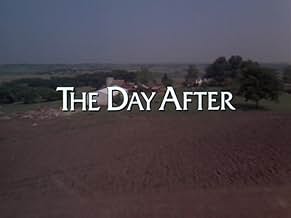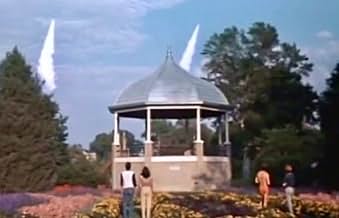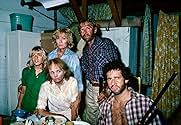Wenn dieser Tag kommen sollte, wäre es das Ende eines jeden Tages! Die Auswirkungen eines verheerenden nuklearen Holocaust auf die Bewohner der kleinen Städte im Osten von Kansas. Das wäre d... Alles lesenWenn dieser Tag kommen sollte, wäre es das Ende eines jeden Tages! Die Auswirkungen eines verheerenden nuklearen Holocaust auf die Bewohner der kleinen Städte im Osten von Kansas. Das wäre der dritte Atomkrieg gewesen!Wenn dieser Tag kommen sollte, wäre es das Ende eines jeden Tages! Die Auswirkungen eines verheerenden nuklearen Holocaust auf die Bewohner der kleinen Städte im Osten von Kansas. Das wäre der dritte Atomkrieg gewesen!
- 2 Primetime Emmys gewonnen
- 6 Gewinne & 11 Nominierungen insgesamt
- Stephen Klein
- (as Steven Guttenberg)
Empfohlene Bewertungen
So why is there any discussion of the differences? To debate the flaws and merits of one horror in many variations is pointless, for they are all important, all special and all as relavant today as they were when they were first created. Perhaps we have learned nothing?
*** out of ****
It was just six years after this movie came out that the Berlin Wall came down at the start of the collapse of the Soviet Union. By 1983, when this film was made, the Soviets had greatly built up their military armament under Leonid Brezhnev. But even his reign at the head of the USSR (1964-1982) was after the worst scares and threats of nuclear war. The most dangerous time of the Cold War was from its start at the end of WWII – under Josef Stalin, through Nikita Kruschev in October, 1964. Kruschev sent Russian tanks to put down the Hungarian Revolution in November 1956. He was at the helm of the USSR during the Cuban Missile Crisis in October, 1962. And it was during his rule that the Berlin Wall went up, beginning on Aug. 13, 1961.
The placing of this movie in the U.S. heartland was significant. It was here that the U.S. had two major defense systems that it hoped would be the greatest deterrents to nuclear war. The first was the Strategic Air Command (SAC) headquartered at Offutt Air Force Base south of Omaha. As the movie noted, that was about 190 miles north of Kansas City. SAC was established in 1946 and was deactivated in 1992, after the fall of the Soviet Union. SAC had several bases around the U.S. with long-range bombers equipped to deliver nuclear bombs to the USSR.
And, from 1961 until its end, SAC operated an Airborne Command Post out of Offutt. For the next 30 years, an airborne command center would be aloft over the central U.S. at all times. The first aircraft fitted and used for such duty was the EC-135. By the 1970s, the Air Force acquired B-747s for this task. The airborne command rotated so that the active command aircraft would never be caught on the ground or in the air near any U.S. site that might be a target for Soviet missiles.
The second defense system was the installation of some 1,000 Minuteman missiles. These were housed in underground silos across several states – from Montana to Missouri. "The Day After" shows this aspect very well. The Minuteman Missile program began in 1961 and has had three upgrades of replacement missiles. Many of the original sites were abandoned and turned back to landowners after strategic arms reductions. But a decade into the 21st century, the remaining U.S. missile defense force included some 450 third generation Minuteman missiles.
Besides these aspects, this film is also of interest to me for personal experiences. After attending college one year, I worked on a survey crew in the summer of 1961 to lay the cable for missile silos in southeast Nebraska. These were Atlas missile sites to protect one of the SAC bases – at Lincoln. That base, since closed, then had 120 long-range bombers. Then, by early 1962, I was a paratrooper stationed in West Germany. The U.S. and NATO were replenishing their military forces that had been allowed to decline after WWII occupation ended in 1957. The rebuilding was triggered when East Germany began putting up the Berlin Wall in 1961. At the same time, the Soviets were increasing their forces along the Czech border. In this movie, that's where the Russians invaded West Germany through the Fulda Gap. In my first months in Germany, we took part in combined military maneuvers and war games along that border. Our units had border guard duty and we laid land mines. We also had the then-secret Davy Crockett tactical nuclear weapons. The movie script has an account of three nuclear devices exploding over Russian troops that had invaded West Germany.
It may be hard for people born in the last few decades to grasp the time and circumstances of the Cold War. But, besides our experiences growing up under the very real threat of nuclear war in the 1950s and 1960s, many of us have met people who lived under Soviet oppression. Should we not trust their words and take their warnings to heart about such tyrannies?
While serving in Germany, I met another paratrooper who was from Hungary. He had been a student in Budapest during the Hungarian Revolution in the fall of 1956. He had tossed Molotov cocktails at Russian tanks, and later escaped to the West where he joined the U.S. Army. He became a friend and later flew to the U.S. to take his citizenship test, and be sworn in as an American. Calmer, wiser leaders have been the rule among the world's military powers the past few decades. But now we have smaller countries with nuclear capabilities. Pray that reason will continue to outweigh radical ideology so that we never have a nuclear disaster like that in "The Day After."
That didn't matter. The film had as great, and possibly even more of, an impact on those of us out on the "tip of the spear" as it did on those back home. The military characters seen in the film were not actors -- they were contemporaries of ours, some even familiar faces -- so we felt a true connection to the story. The tension between the US and the Soviet Union was real and nobody knew better than we how nasty things could get in a short period of time. Even as we watched the film over the ship's closed circuit television system, Soviet military units were intent on locating and targeting our Battle Group. Our job, our daily routine, was part of the story, which emphasised the point that we were responsible for keeping the peace and to not allow events to escalate as we all feared could happen.
The reaction I remember most from this film was worry for family back home. -SPOILER- The one airman who left the silo area to reach his family before the missiles arrived displayed a sentiment that we all felt. No one aboard our ship would shirk his duty, but we all understood the sentiment that once duty is done, family is foremost in mind.
The argument could be made that the film was rife with error, but I maintain that it ultimately succeeded in what it was designed to do...make people seriously consider the consequences of nuclear war. That point was not lost on those of us aboard the Ranger at the time. While I watched the film again just recently (21 years after the first viewing), the lesson was still not lost. We may or may not be vulnerable to such a massive strike as what was feared back in the 1980s, but nuclear terror is still a very real possibility. It is as imperative now, as it was then, that we ensure that this type of calamity is never visited upon anyone, especially those about whom we love and care.
Yes, better special effects would make from some jaw-dropping images, but would that improve upon the film's message? In my opinion, no.
Wusstest du schon
- WissenswertesThe program originally aired on November 20, 1983. It remains the most-watched TV movie in U.S. history. Estimates put the viewership at over 100 million Americans, with a Nielsen share of 62 percent.
- PatzerWhen Dr. Austin (Lin McCarthy) is explaining the effects of the electromagnetic pulse (EMP) from the nuclear blast, he says. "It's all theoretical. It's never happened before." In actuality, the United States detonated a 3.8 megaton warhead at an altitude of 50 miles, 1 August 1958, in the Operation Hardtack Teak shot nuclear test. This event caused unexpected communications disruption and damage to electrical equipment in an area that ranged between Hawaii and New Zealand. It was the first observation of the EMP effect.
- Zitate
[intercontinental ballistic missiles are being fired]
Cynthia: What's going on?
Joe Huxley: Those are Minuteman missiles!
Cynthia: Like a test, sort of... like a warning?
Joe Huxley: [shakes his head, staring at the missiles in awe and disbelief] They're on their way to Russia. They take about 30 minutes to reach their target.
Aldo: So do theirs, right?
- Crazy Credits[After movie has ended, before end credits.] The catastrophic events you have just witnessed are, in all likelihood, less severe than the destruction that would actually occur in the event of a full nuclear strike against the United States. It is hoped that the images of this film will inspire the nations of this earth, their peoples, and leaders to find the means to avert that fateful day.
- Alternative VersionenThe rare laserdisc version (released by Image Entertainment in 1995) is advertised as being a director's cut. This version runs 127mins, is widescreen in its proper ratio of 1:75:1 and has a commentary track by director Nicholas Meyer. At the time of this release full versions of the film were not readily available. So it stands to chance this director's cut is actually the same as the current mgm dvd (US region 1) as far as content and running time goes, with the exception of the widescreen format and commentary track which so far has only be found on this laserdisc.
- VerbindungenEdited from Zwei Minuten Warnung (1976)
































